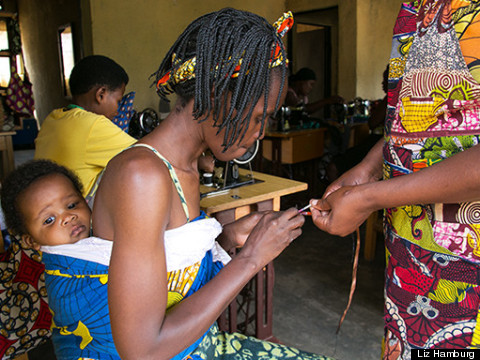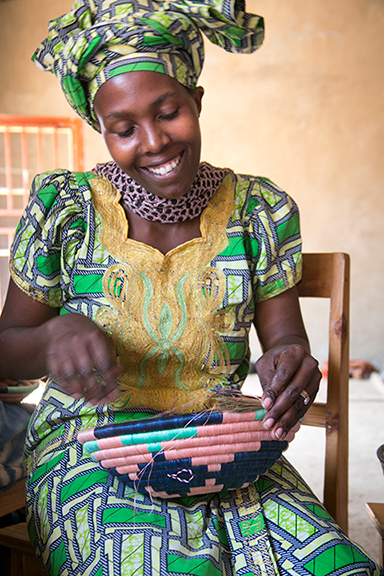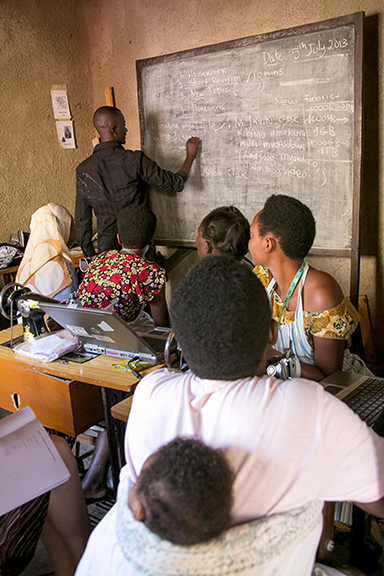I just returned from a two-week trip to Rwanda -- my first trip to Africa. I was there to work on a project for Indego Africa, a U.S. based social enterprise that's providing access to markets and education to women-owned businesses in Rwanda. Indego is working with almost 500 women in 13 women-owned, artisan cooperatives in Rwanda -- giving them training in business, English, computer skills and literacy for those who need it. They are also providing access to markets in the U.S. through direct retail and distribution partnerships with U.S. retailers like Nicole Miller, Jonathan Adler and J Crew. The goal is "to propel the women to sustainable economic independence." I visited five of the cooperatives working with Indego Africa, on my trip, where I was observing the training sessions and conducting some workshops on basic entrepreneurial topics.
As I left for my trip, a debate in the U.S. was still brewing, fueled by Sheryl Sandberg's Lean In and the various responses to it from working moms around the country.
I was thinking about this as I watched the women I met at the artisan cooperatives in Rwanda "leaning in". Yes, they are literally leaning in, leaning over, leaning forward, often with a baby strapped to their back, a few more by their side and a heavy load of water or wood on their head in the morning and, thanks to Indego, a purchase order in their hands in the afternoon.

The women we met at the cooperatives and throughout the country were amazing and inspiring. These women are survivors -- physically and mentally strong and determined to make a better future for their families. 2014 will be the 20th anniversary of the genocide in Rwanda. Almost 1 million Tutsis killed in 100 days. A devastating blow to a country of around 7 million. 50,000 women were left as widows, estimates are that up to 20,000 children were born to women as a result of rape during the genocide and 75,000 were orphaned -- most now adults, many with children of their own. Almost everyone we met had been touched personally by the genocide and many had directly been affected and witnessed atrocities that I can't even begin to imagine.
The women I met are leaning in because they don't have a choice. They have been rebuilding their lives and the country over the last 20 years. And, perhaps because they don't have a choice, they don't seem to feel the angst and the guilt that has been rippling through the U.S. as women who have the luxury to make a choice are debating what's right for their families. On average, most Rwandan women have 4-5 kids, although many of the women I met had many more.
Epiphanie, at the Ejo Hazaza cooperative, has five children ages five to 15 years old. She is HIV positive and was a farmer growing cassava, sorghum, beans and vegetables before she joined the co-op where all of her fellow cooperative members are also HIV positive. They met at a local health clinic and formed the co-op originally to earn income to purchase baby formula that would replace breastfeeding for members, who were concerned about passing along their HIV to their children. Now, the co-op, which focuses on beading, has achieved so much more. Epiphanie said that she likes the solidarity of working together with other women in similar situations to hers -- they offer each other support when, often, they are shunned by the community and their own families because of their HIV status.
The Treasurer of the Imirasire Cooperative has six children. She was also a farmer before she began working in the cooperative. She weaves baskets -- it takes her five days on average to make one that she sells for 6,000 Rwandan Francs (a little less than $10). It costs her 1,000 RW Francs to make and she gives 10 percent back to the co-op. The rest goes to her family. A small amount by our standards, but enough for her to support her family, pay school fees and pay others to farm her land. This co-op is part of the Millenium Project set up by Jeffrey Sachs. There are over 150 women in the co-op producing over 1,000 baskets a year.

Melanie had her first child at 20 years old and now has nine children. Her income has doubled since she started working at the Cocoki Cooperative where they are partnering with Indego to produce products for designers including Nicole Miller.
Family defines most of the women. In fact, in Rwanda, women are known by their first child's name. A woman with a son named Yves is known as "Mama Yves" to her friends and family. Identity is so tied to their children that it becomes part of who they are. When I asked who was taking care of the children while they were at work, they didn't even understand the question -- the little ones were with them, the older ones were taking care of themselves or watched by relatives or the community. There was no emotional conflict about "choices." The babies were at the co-ops with their moms -- most of the time strapped to their backs with a cloth--a low cost version of our fancy baby carriers.

Often, they were breastfeeding while participating in meetings or sometimes even doing their weaving or sewing. The toddlers were running around or asleep on a blanket in the corner of a room. If the women were participating in a training class, taking a purchase order or doing quality control and a baby started crying, one of the other co-op members would sometimes scoop the baby up and carry him out so the mother could keep going. This was community at its best.
These women are the ultimate "jugglers." "Work," as we define it, is just a small piece of what these women do all day. Most are living in villages with no running water and little or no electricity. It is a very common site to see women in beautiful hand-made long dresses and turbans and small children with large yellow canisters filled with water carried on their heads. Rwanda is known as the Land of a Thousand Hills and let me tell you, it wasn't easy to climb those hills with nothing other than my purse -- it was difficult for me to imagine doing it with a baby on your back and water on your head. (I'm waiting for someone to come up with the next exercise class craze built around routine tasks in Rwandan -- you build some serious muscles and lung capacity and look graceful doing it!)
So, the women in the co-ops are getting up with the sun, taking care of their children, gathering water and often firewood, cooking over a coal stove, getting their children off to school and then heading to their cooperative, where they are weaving baskets, making jewelry, doing beading work or sewing. Many of them are also working on their own businesses on the side -- mostly agricultural businesses -- selling milk, cows, goats, cassava or sorghum. Most were eking out a living as farmers before they joined the cooperatives. Now, they were ready to improve their lives and the lives of their families. But, it means working almost three jobs -- taking care of their home and families, working in the co-ops and often working on the side.
Indego's training and access to markets seems to be making a difference -- they have impacted more than 1,300 children and other dependents who are getting improved access to food, housing and education.
The women we spoke with were hungry for information and excited to be partnering with Indego Africa. Many of them were taking up to 6 hours of class a week in business training, English and computer skills, plus homework. That's on top of the work that they are doing in the co-op and everything else. They are determined -- and somehow make it all work.
Their lives have been touched by tragedy and yet, they are joyful and happy to be a part of a community that the cooperatives have given them. The Twiyubake cooperative in Kayonza is in an area that was one of the hardest hit by the genocide. The co-op consists of genocide widows who are working alongside of the wives of imprisoned "genocidaires" (those who killed during the genocide). They have formed a community and are weaving banana leaves into beautiful jewelry and bags. The women of Ejo Hazaza, who told us stories about being beaten by their husbands because of their HIV status, spontaneously started dancing and singing during a break from one of the training sessions.
They are leaning into the future with determination and pride.
Photos Courtesy of Susan Liebold
